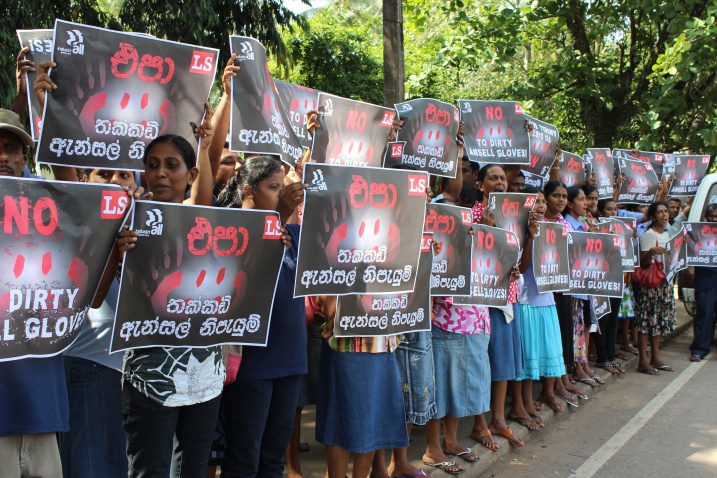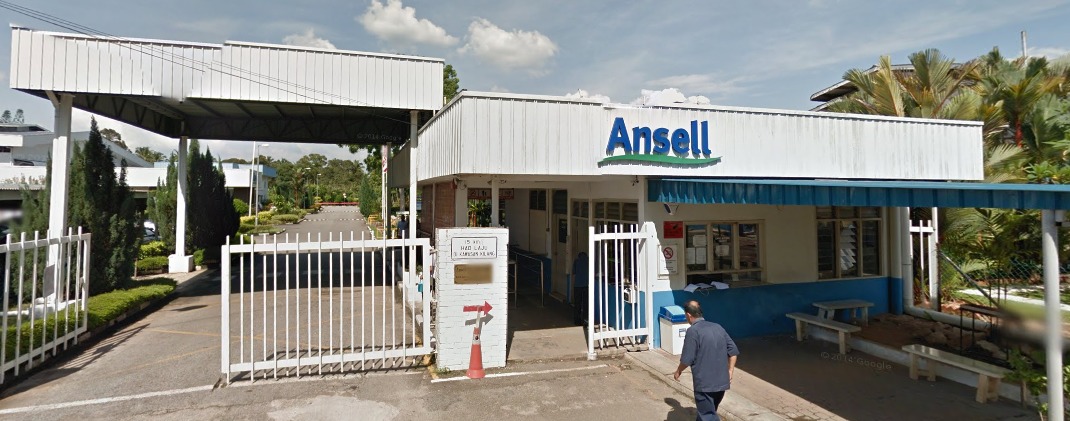Surgical gloves used in hospitals across Scotland are made in factories where forced labour, long hours and “union-busting” have been reported.
The Ferret can reveal that since 2013 NHS Scotland’s procurement agency has been buying surgical gloves made by an Australian company called Ansell at its in factories in Sri Lanka and Malaysia.
Trade unions and independent auditors have alleged abuses at three Ansell factories in these countries including low pay, overwork and migrants workers not being allowed to leave until their contract is finished.
Other allegations include unproven claims that dust and radiation in a factory were contributing to workers getting leukaemia, cancer and reproductive problems. Unions also allege that employees were forced to urinate at their workstations in order to keep up with demands.
The revelations have prompted calls from the Scottish Greens for the glove contract to be cancelled and for Scottish ministers to review procurement processes. But the NHS denies that it has bought gloves “unethically”.
Green health spokesperson, Alison Johnstone MSP, said: “Fair work processes must be at the heart of the procurement process in Scotland’s health service. The conditions described fall well below what would be considered acceptable.”
She added: “If these reports are accurate then the contract should be removed. The Scottish Government must conduct an urgent review of its procurement processes to ensure other such contracts don’t support unethical organisations.”
NHS Scotland’s procurement is managed by a body called National Services Scotland (NSS). NSS’s contract with Ansell was signed on November 2012 and the company’s gloves have been used in Scotland since April 2013.
NSS confirmed to The Ferret that the Ansell gloves they buy are made in Malaysia and Sri Lanka. Ansell has two surgical glove factories in Malaysia and one in Sri Lanka.
In November 2013, the Switzerland-based IndustriALL global trade union complained to the Organisation of Economic Cooperation and Development (OECD) about working conditions at these factories. The complaint was submitted on behalf of the Sri Lankan FTZGSEU union and the Malaysian NUECMRP union.
IndustriALL accused Ansell of “ruthlessly exploiting” the 2,500 workers at its Biyagama factory in Sri Lanka.
The union said that “wages offered by Ansell and the resulting living conditions of its workers do not ensure an existence worthy of human dignity”. Low wages meant workers had poor housing conditions and limited access to medical care and social services, IndustriALL claimed.
IndustriALL also accused Ansell of failing to investigate whether the factory’s dust and radiation were contributing to workers getting leukaemia, cancer and reproductive problems.
At the same factory, the union said that the company’s production targets were “inhuman”, with workers fainting or being forced to urinate at their workstations in order to try to keep up.
“The company forced workers to sign letters “voluntarily agreeing” to the speed-up and coercing union members to relinquish their union membership,” IndustriALL said.
According to IndustriALL and the FTZGSEU’s complaint, the local union president Athula Kamal Kaluarachechi, was chased down and physically assaulted by two unknown persons on a motorcycle.
Kaluarachechi was subsequently sacked along with ten other leading trade unionists at the factory. In response, 281 workers went on strike and were all themselves sacked.
After a three year international campaign and boycott, Ansell signed a memorandum of understanding with the trade union in 2016, agreeing to reinstate the sacked workers or offer early retirement packages.
IndustriALL’s complaint to the OECD also criticised working conditions and alleged “union-busting” at Ansell’s two Malaysian factories in Melaka and Kulim.
IndustriALL claimed the company attempted to provoke industrial action at the Melaka factory by making working conditions worse. When workers complained, they say the company took disciplinary action against those seen as ringleaders.
In 2015, the Swedish region of Jönköping ordered an investigation into how the surgical gloves it was ordering were made at Ansell’s Melaka factory.
The audit found that, while overall the factory was a good place to work, foreign workers were forced to work for up to three years until their contract was complete.
These nearly 800 workers from Indonesia, Nepal and Myanmar were recruited by agencies in their home countries and made to pay a recruitment fee to get the job and to pay for their own travel to Malaysia.
To get this money, which was equal to about three months wages at the factory, they took out loans from the company which they paid back over about ten months.
Once in Malaysia, their passports were kept by the factory’s human resources department and they had to be back in their dormitories by 11pm.
Foreign workers were not allowed to leave the factory until they had completed their contract unless they have proof of poor health or an important family reason like a marriage.
The auditor, Goodpoint, said these practices meant the foreign workers were not free to leave their employment if exploited.
Jakub Sobik, a spokesperson for Anti-Slavery International, could not comment on the circumstances of this specific case. “Withdrawal of wages until the end of the contract, restriction of movement or confiscation of passports are indicators of forced labour,” he said.
Forced labour is defined by the Home Office as a type of modern slavery.
A follow-up audit by Goodpoint in 2016 found that the factory was no longer using forced labour but workers were still doing up to 140 hours of overtime a month on top of their regular twelve hour shifts four days a week.
Photographs of payslips seen by The Ferret show that, as of August 2018, workers in Melaka were still doing up to 90 hours of overtime a month.
Payslips from Ansell’s other Malaysian factory in Kulim showed that one worker there did 166 hours of work on top of their normal 40-hour working week.
The British Medical Association Medical Fair and Ethical Trade Group has investigated NHS glove procurement. “Your report suggests that the systems that NSS has in place to protect workers could be improved,” said the group’s founder Dr Mahmood Bhutta.
“We know that paper based assessments are an unreliable way to identify, let alone remedy the horrendous working conditions identified in some of the gloves manufacturing sector. I also know that NHS Supply Chain in England and Wales is looking to overhaul its systems for protecting workers, and I hope the NSS will look to do the same.”
NSS said that its 2012 contract with Ansell included terms covering ethical employment standards and policy. “Suppliers were requested to provide details of the measures taken to operate as an ethical company which respects the diversity in the communities in which they operate as well as the promotion of corporate social responsibility and conditions of employment,” an NSS spokesperson said.
When asked if NSS had been aware of the allegations against Ansell and whether it checked that information given by suppliers was true, the spokesperson declined to comment.
But the spokesperson said that failure to apply ethical standards could result in a supplier being given a written warning and could result in the termination of the contract – but no written warning had been given to Ansell.
NSS insisted it had a duty to ensure that the goods and services it bought were produced ethically. “To the best of our knowledge, based on the information provided to us by Ansell, NHS Scotland has not been buying unethically procured surgical gloves through the framework for supply of these goods,” the spokesperson said.
“NSS take any allegations of unethical procurement very seriously and is committed to ensuring that all NHS Scotland products are procured ethically and sustainably.”
The NSS spokesperson added: “We have sought input from Ansell and assurance on full compliance with their current ethical policies and standards has been provided.
“Ansell continue to make us aware of the steps they have taken in developing their approach to sustainability, especially in the areas of human rights and safety. These include the adoption of a human rights statement in addition to their existing global code of conduct and supplier code of conduct.”
The Scottish Government said that the new procurement reform act puts more pressure on authorities to buy ethically.
A spokesperson said the new act “places a legal obligation on contracting authorities to include in each public contract or framework agreement conditions relating to the performance of the contract or framework as necessary to ensure that the contractor complies with environmental, social and employment law.”
Ansell film of glove production
Ansell declined to comment on allegations about working conditions in specific factories. But the company has announced a major review of its labour standards across the world.
“We are proud of our track record in creating a safe working environment at Ansell and we strive to promote and respect the rights and well-being of all our employees,” said a company spokesperson.
“We are committed to leading our industry in responsible corporate practices. Over recent months, there has been increased scrutiny of labour standards and practices in our industry globally.
“Ansell welcomes attention to these issues and supports the call for increased transparency on enhanced standards protecting the health and safety of all workers.”
The company pointed out that labour laws and standards were “complex” and national systems regulating work hours, overtime, rest days, benefits, recruitment and housing conditions varied from country to country.
“As labour standards are fundamental to the health and safety of our employees, we have begun a comprehensive global review of our supply chain, covering both third-party suppliers and Ansell’s own facilities,” the spokesperson added.
“The review will assess whether implementation of our standards has been fully effective and appropriate and whether our standards need to be updated or strengthened further to ensure an even safer working environment. We will also assess the effectiveness of mechanisms we have in place to provide independent verification of our compliance with these standards.”
According to the company, the review will affirm the requirement for supply chain partners to meet standards and to identify enhanced and independent verification to ensure compliance. “Our foremost responsibility is to meet the legally required standards of the countries in which we operate,” continued the spokesperson.
“We will also assess the guidelines of the International Labour Organisation and other recognised organisations to determine what additional standards are legal and appropriate in the countries in which Ansell operates and how they could contribute to Ansell’s over-arching objective of securing employee health and safety in every plant and every country.”
The review would result in “realistic timetables for change where needed” and produce “specific road maps” for Ansell facilities and supply chain partners,” the spokesperson concluded.
“We intend to conclude the review within 2019 and publish revised policies and procedures by the 2019 annual general meeting where our chief executive will discuss our action plan, how we intend to get there and will finally detail progress already made.”
Cover image of protest about Biyagama factory thanks to IndustriALL. Photo of Melaka factory thanks to Google. This story was published in tandem with the Daily Record.















